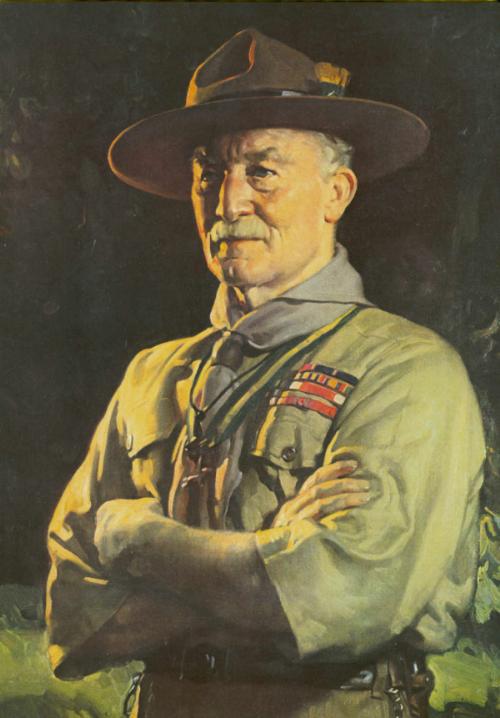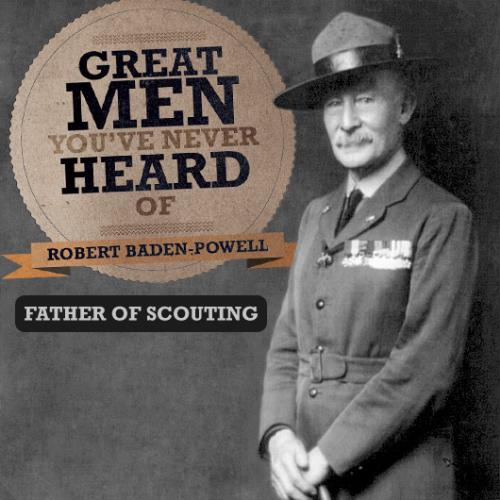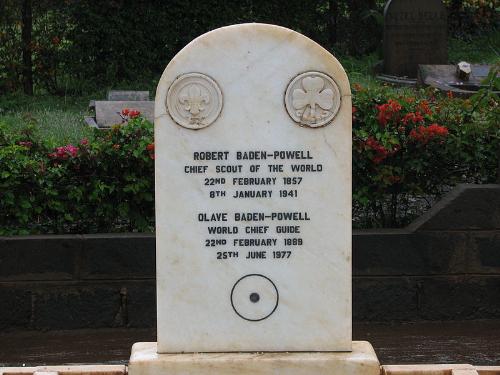


Baden-Powell was born in London, England as Robert Stephenson Smyth Powell, or called Stephe Powell, on the 22nd of February in 1857. Robert Baden-Powell is remembered mostly for the ingenuity he showed in keeping the Boers at bay during the siege of Mafeking while serving in the English Army. The outcome of this siege made him a national hero and brought him a promotion to Major-General. During the Mafeking affair and elsewhere he had often used boys (being small and agile) as scouts to spy out the land or the enemy's movements. Once back in England his mind turned towards adapting this for his home country as a way of sharpening-up and invigorating the nation's youth. He decided to have an experiment where he set up a camp in 1907 on Brownsea Island near Poole Harbour of Southern England. Baden-Powell's Brownsea Island played a part in helping to establish an institution whose power for good in the world is quite impossible to estimate. Twenty boys were chosen for the experiment; some were the sons of Baden-Powell's friends, others the the sons of Poole tradesmen; and so great was their enthusiasm that the camp's duration was extended from a week to twelve days - from July 28th to August 8th. Scouting for Boys was published in January, 1908. Thousands of boys bought the first part of Scouting for Boys; it was sufficient for them that the magic initials B.-P. appeared on the cover. But they were not content with reading about Scouting; they wanted to do it, and if they were not members of a Brigade or Club, they got together in little gangs, formed themselves into Patrols, and got down to practical, out-of-doors Scouting. Then they would try to persuade some grown-up to become Scoutmaster. In this way Scouting spread, and as the numbers of boys rapidly grew, it was obvious that something would have to be done about it. By the end of 1910 there were over 100,000 Scouts in Great Britain; the movement had established itself as one of the leading boys' organizations within little more than three years of that first camp at Brownsea Island. According to legend, William D. Boyce in 1909 had become lost in the dense London fog, but was guided back to his destination by a young boy, who told him that he was merely doing his duty as a Boy Scout (Do a Good Turn Daily). Boyce then read printed material on Scouting, and on his return to the United States, four months later, founded the Boy Scouts of America on February 8, 1910. He intended to base the program around American Indian lore. William Dickson Boyce was born in Pennsylvania on June 16, 1858 to a Presbyterian couple. Boyce worked throughout his life as a school teacher, lumberjack, coal miner, businessman, newspaperman, entrepreneur, magazine publisher, and explorer. William D. Boyce became a multi-millionaire and traveled the world on expeditions which took him to London the day he met the unknown Scout. Boyce felt that Scouting's emphasis on outdoor activity was crucial in producing the type of leaders that America needed because youth reared in cities had too much done for them, whereas those from the country had to learn to do things for themselves. Scouting was focused on teaching self-reliance, citizenship, resourcefulness, patriotism, obedience, cheerfulness, courage, and courtesy in order "to make men". There are many others who contributed to the formation of the BSA; however, these two men are noted for the very early beginning. Baden-Powel is known as the Father of Scouting and William D. Boyce is known as the Founder of the Boy Scouts of America. Boyce died from bronchial pneumonia on June 11, 1929, in Chicago and was buried in his adopted hometown of Ottawa, Illinois, on June 13, 1929, in the Ottawa Avenue Cemetery. Robert Baden-Powell died January the 8th in 1941 and is buried in Kenya.



